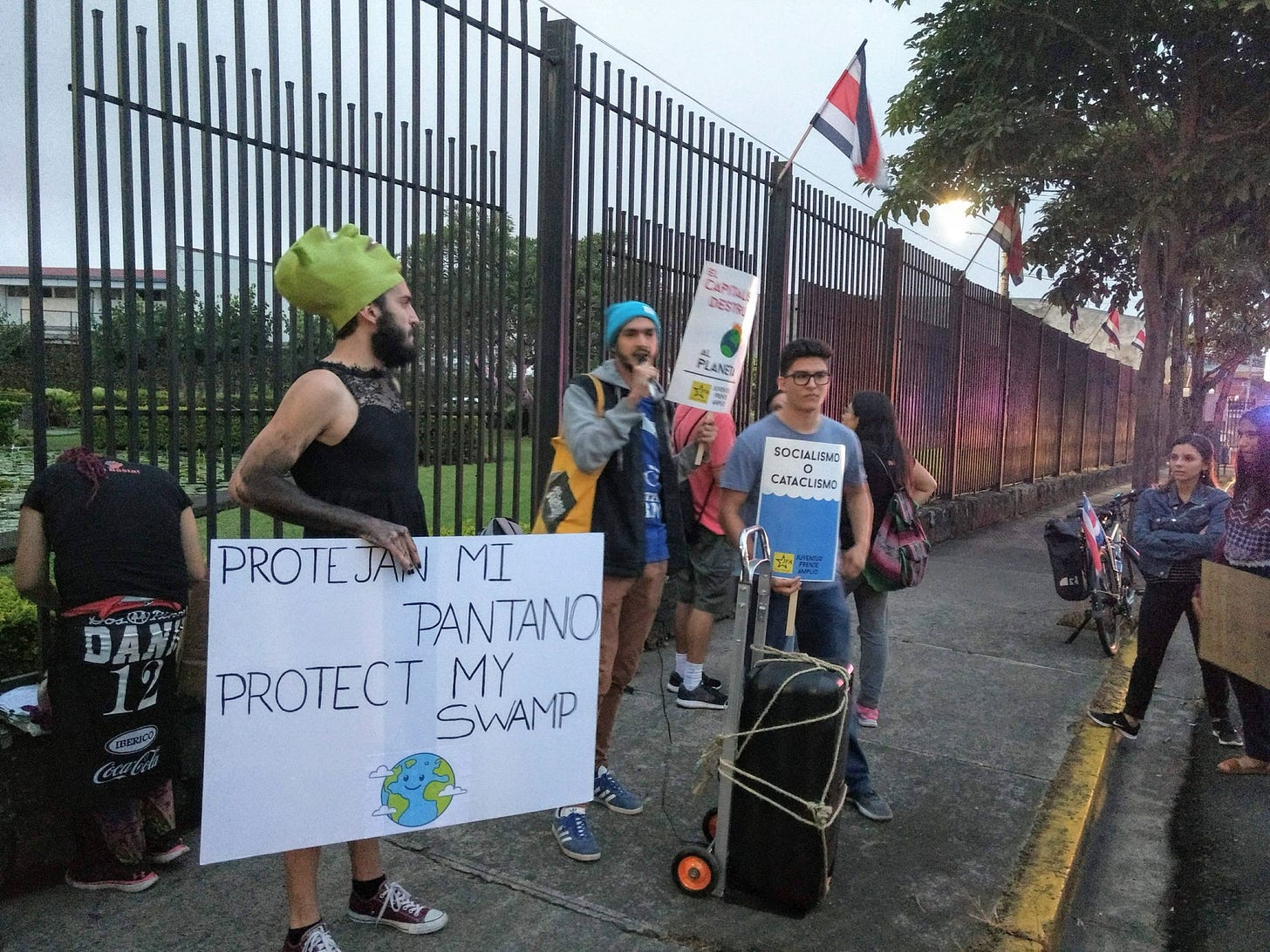Welcome to this latest edition of From a Climate Correspondent. If you'd like to support us, you can invite us for a coffee over at our Patreon page. Thanks for reading!

Young protestors gather in San José, Costa Rica, on 19th September 2019 for the global climate strike. Image credit: Jocelyn Timperley
Greta Thunburg has become the face of the global youth movement asking societies to face up to climate change. But, as she herself has made clear, there are also many other youth activists with strong and powerful messages deserving of our attention.
A new book coming out this week aims to give voice to these young people. In “United We are Unstoppable”, Bloomberg journalist Akshat Rathi reached out to young activists around the world with something powerful to say on climate change.
In the resulting collection of short essays, 60 young writers detail in straightforward prose how climate change became such an important issue for them - and how they are trying tackle it.
Different approaches
There’s 16-year old Lesein Mathenge Mutunkei from Kenya, a keen footballer who has committed to planting a tree for every goal he scores - and is convincing others to do the same. His project, Trees for Goals, was prompted by his discovery that Kenya is losing the equivalent of six football fields a day of forest. “That’s when I decided I must do something to protect our environment, no matter how small it is,” he writes.
Or 26-year-old Tatyana Sin from Uzbekistan, who outlines with cool clarity the problems her country is facing due to melting glaciers, its only source of freshwater. “From a young age I realised what a huge impact human activity can have on nature,” she writes. “I come from a region close to the Aral Sea. Well, it’s close to what is left of it.”
One of my favourite essays came from coral-reef lover Kailash Cook, who spent the first ten years of his life on a small island in the gulf of Thailand called Koh Tao. He was shocked when a record breaking bleaching event in 2010 killed many of the reefs that he had grown up with.
A field of blanching coral he particularly loved disappeared within a period of around two months, he writes. “Just a field of rubble and sand.” Cook, who now lives in Australia where he has witnessed further coral bleaching events, says the most challenging aspect of being a youth activist is the restrictions placed on young people.
Encountering climate change
These young people are acting on climate in whatever small or large ways they can. But they “don’t just bring new energy to the climate fight”, says Rathi in the book’s foreword - they also bring fresh perspectives and tactics. Many have clear ideas about what action is needed. “Show [young people] that they can be a part of the solution, then share it with other young people on social networks,” says Karel Lisbeth Miranda Mendoza, a 27-year old climate activist from Panama who wants more hands on activities for youth on climate change.
One of the most striking things about these essays is learning how many children across the world are facing the impacts of climate change before even knowing what it is. Thirteen-year-old Catarina Lorenzo witnessed a coral bleaching event last year when diving near her home in near Salvador, Brazil; she later learned about climate change in school. Others are listening to these stories from other people - like João Henrique Alves Cerqueira, another Brazilian, who travels by bike to visit traditional and indigenous communities at the forefront of the climate crisis.
My 9-year old niece Saphia Timperley Strickland read a few of the essays in the book and told me what she thought. “I think it will encourage you to not waste the earth, protect nature and save the environment,” she said. Well, we can only hope.
Must reads from the region
‘We’ve become hostages’ Thousands of migrants from Uzbekistan are stranded in makeshift camps at the Russia-Kazakhstan border, Maria Shesterikova, Meduza Around a thousand Uzbekistanis are reportedly stranded as they try to hear home from Russia to Kazakhstan, according to this report from Raka-based outlet Meduza. They are now stuck in a makeshift camp in 37C heat.
With no work in lockdown, tour operators helped find coral bleaching on Western Australia’s remote reefs, James Paton Gilmour, The Conversation Climate change is now overwhelming reef management efforts on even Australia’s most remote coral reefs.
Climate change is fuelling the spread of deadly tropical diseases, Lauren Evans, Wired UK Climate change may be bringing kala-azar,one of the most deadly parasitic diseases in the world, to places it never previously existed
What I’ve been watching
My and my partner have been assigning each other a criteria for a weekly film. He asked me to choose a Kazakhstani film: we ended up watching Tulpan, a touching coming-of-age film set in the beautiful, dusty and remote Kazakhstan steppe. It tells the story of Asa, a recently discharged sailor who dreams of owning his own sheep herd.
Been forwarded this email?
Did someone send this on to you? Why not sign up yourself!
Who we are
From A Climate Correspondent is a weekly newsletter run by four jouranlists exploring the climate crisis from around the globe.
Lou Del Bello is an energy and climate journalist based in Delhi, India.
Jocelyn Timperley is a climate journalist based in San José, Costa Rica.
India Bourke is an environment journalist based in London, UK.
Mat Hope is investigative journalist based in Nairobi, Kenya.


